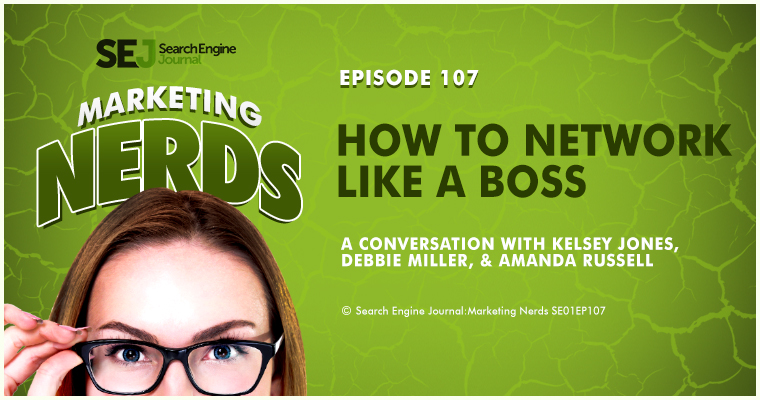Podcast: Download
Subscribe: Apple Podcast Google Podcasts Spotify
Visit our Marketing Nerds archive to listen to other Marketing Nerds podcasts!
In this episode of Marketing Nerds, Debbie Miller of Social Hospitality, Amanda Russell of Ghergich & Co., and myself discuss experiences with networking and how to meet new people.
Mandy, what was your most awkward networking or conference experience?
My alma mater is known for its networking, and I was able to get a job interview thanks to a woman who I didn’t know, but we had both gone to Texas A&M. Due to a series of unfortunate events, I ended up at the interview late, looking like I had been caught in some sprinklers, completely unprepared. They were still very gracious, they let me come in, we were talking, and one of the interviewers asked what I wanted to do.
Why I wanted this position. I said, “Well, I don’t want to work for a company that’s all about profits and driven by profits. I want to do good in the world and really forge my place as a world changer.” They’re both staring at me and she goes, “We work with the pharmaceutical industry. We are all about profit.” The woman you had referred me was just sitting there with this smile on her face like I don’t even know what to do with you right now. So if she is out there listening, I’m sorry and thank you for trusting in me even when I was not trustworthy. That’s okay. It just wasn’t meant to be, but I ruined it. It was awful.
Yeah, but now you know. Maybe it’s good that you knew that instead of getting the job and hating it.
Oh, for sure, and I should have done more due diligence on my part. This was early on in my career. But I felt so terribly because she reached out to me because I’m an Aggie, because I went to this school, and I just completely dropped the ball.
That is pretty awkward. Debbie, can you top it? Do you have an awkward experience?
I can not top it. I cannot think of one specific instance that was incredibly awkward although there have been some awkward conversations definitely that have happened. This might be more of a pet peeve than an awkward situation, but my awkwardness is usually from conversations that don’t flow naturally whether it’s myself or them. It usually stems from just not having compatibility in whatever we’re talking about or whatever the case may be.
There have been times where I’m talking to someone about social media, and someone they know or met earlier in the night happens to come up at a networking event and join the conversation but they don’t really fit in what we’re talking about, which is not to say that what they’re talking about isn’t important to them, but it just makes the conversation go downhill really quickly if you don’t know how to communicate with someone in a different industry or just on a totally different wavelength. I’ve had that happen a couple of times.
I think also the people who don’t network well, they just come up and hand you their business card and say this is what I do, very sales-y. That kind of stuff bugs me more, and I don’t know how to communicate with those people especially if they’re in a different industry, something that’s not of compatibility with what I do. Also, people who add you to their email list right away when they get your business card. I want to politely say remove me right now, I didn’t consent to this. But obviously, you can’t say that so then you have to very politely unsubscribe. I’ve had people write back to me and say, “Oh, why did you unsubscribe?” And I’m like “Are you kidding me?”
Just always make sure consent is there when adding people to your mailing lists and make sure it’s a fit for whatever … even if they’re you’re semi-friend, make sure it’s a fit so you don’t create these awkward situations.
What was my most awkward networking moment?
There used to be these tech conferences in Kansas City and they don’t have them anymore. I don’t get as nervous now just because there’s all these SEJ Summits that we have every year and Pubcon that I don’t get as nervous.
This one tech conference I was super nervous and I was texting my brother and I’m like, “Oh my god, what if I introduce myself to someone and they just don’t want to talk to me?” And my brother’s like, “Oh, that’ll never happen. When will that happen?” Well, it happened to me because I went up and introduced myself to this guy and he was like, “Yeah, I’m looking for my coworker right now,” and literally walked away, and I was just standing there. It was my worst nightmare.
It wasn’t like it was the end of the day, and he’s trying to get a ride and I’m running after him. He was just standing around. He didn’t look like he had a purpose. If someone is on their phone or walking away from me, obviously I’m not going to chase after them, like yelling my name, so I don’t know. I feel like nothing bad can happen to me after having that bad experience because that was like my worst fear realized.
Are there certain things, types of people, certain banter, or the way people act that you think makes networking less awkward?
Mandy: I think it’s just when people don’t take themselves too seriously and are actively listening to others and want to get to know others. I’ve met some incredible friends thanks to networking and conferences and these different events. Kelsey, you, and Debbie, and Michelle Lowry and just all these different people who I now consider good friends who I’ll text on a regular basis. You guys help me with my professional life and my personal life and that’s been huge. I appreciate that.
Debbie: To piggyback off that, I was going to say a similar thing too. I’ve made a lot of friends through social and networking. I think it comes down to compatibility. Kind of the opposite point of what I was saying before about lack of compatibility making it awkward. If there is compatibility, that can help cultivate relationships, whether they be business relationships or personal ones. I think the business ones can happen if there’s mutual, business needs. Or issues that arise that the two would work well together on.
Personally, I think it just comes down to having a similar sense of humor, obviously stuff to talk about. I have some varied levels of friends that I’ve made through networking. Some I talk more about business with, other we talk about movies or books or stuff like that. I think it spans different subjects as well. It just comes down to the different personalities and how you are with them. But I think a sense of humor is always a good icebreaker. And people who genuinely want to help. There are some people who act like they want to help, but don’t really. People who make those introductions to you to other people who might be a good fit for you professionally … that’s always helpful to show that you’re a genuine person and give back to someone else.
Kelsey: I agree. I think sense of humor is huge. Humor brings people together than anything else, I would say. Being open and positive and not talking about yourself. You know what I hate? When you’re at a conference and you have a name badge that hangs down like in between your boobs and then people are staring at your name tag to see where you’re from to decide whether or not to talk to you. I hate that. Because it makes me feel like if I wasn’t with a huge company, they wouldn’t waste their time with me.
I’ve seen people at conference see who I work for and then decide to talk to me and that bothers me. I feel like you need to look people in the eye and give them a chance because you never know who someone might know. For instance, one of my good friends is a cake and pastry chef, and she knows one of the directors at Slack, just randomly. You never know the person you meet will know, and I think that’s something really important to remember.
Mandy: It’s always fun to meet the Rand Fishkins or the Sarah Birds of the world, but when you meet people who aren’t as far up the totem pole and watch them as they go up and you have been there from day one, that’s even better. You get to experience their triumphs with them and then 10 years road, you’re like “Well, I knew him when he was just a widget pusher in the assembly line.”
Debbie: True, that’s a good point. It’s cool watching. That’s what I like out of networking. Getting to meet people who are just as driven as I am and supporting each other. Helping them when they need help, sending referrals when I can, giving them opportunities to do interviews or talk to other people. That’s just as important as what happens afterward … after you meet someone.
What are some good icebreaker questions to ask people? Do you just go up to a group of people and introduce yourself? Or do you capture a lone gazelle off by the drink table and ask him/her to talk to you? What’s your strategy?
Debbie: I usually will look at body language. It depends if I make eye contact with a solo gazelle, I might start a conversation with them. Usually, I’ll look at body language of groups. If there’s a circle of 3 or 4 people and they’re all looking at each other and clearly engaged in their own conversation, I don’t want to pop in and interrupt that. Usually, you can see people who are more open; they’re more facing outward. They’re still talking to each other, but they’re more open and willing to take on a solo gazelle such as yourself. Then you can sweep in there and enter into the conversation.
Body language is something that’s subconscious when networking, but when you stop and audit the room, you can usually see who’s open and who’s closed and that’s a good way to find people to talk to. I’ll just usually go up and say, “Hi, I’m Debbie,” and have brief introductions and see if obviously certain people, there might be worth expanding a conversation with. Others if there’s not a fit, you can move on pretty quickly. I think just introducing and where are you from, what do you do, however, the conversation gets rolled and take it from there how long to stay with that group or transition to another one.
Mandy: I think that’s smart, too. You go to a group where you have some people, two or three, who are just actively listening. Then you join in as an active listener and then little conversations break off from the big groups as they get too large, and you’re part of one of these smaller groups. The everyday banter of Hey, where are you from, how did you get here, how did you hear about this event.
Then I like to ask them the horrible questions that every therapist asks like “What do you enjoy about your job? Do you have a dream job? What’s your next step? What do you enjoy doing? Do you volunteer?” Asking those questions that maybe aren’t quite as common. Because if you’re an editor, they’re like, “Oh, what do you edit for,” and I’ll answer the question. But if they say, “What is your dream job?” Oh, well sit down, because this is a twenty-minute conversation, and I’m going to tell you everything. That may open it up with someone else who may have a dream job that’s completely separate from what they’re doing currently. Maybe you can help them get there or you can connect them to someone who can get them there and that’s another way that those relationships are solidified … When you can help each other get to the dream job or the goal or the next milestone.
Kelsey: That’s really good advice. People like talking about themselves. It doesn’t matter how awkward they are. It’s just the way we are as humans.
What’s the one thing you do or you could recommend to help people feel more comfortable?
Debbie: I think just going in with an open mind and not being shy. You might feel self-conscious if you’re new to networking, and I certainly did as well, but I think everyone feels that way. Just being confident and assertive and talking to people and not being afraid to go up to those open groups and introduce yourselves as opposed to sitting in the corner awkwardly.
Mandy: Yeah, I would just say fake it. There are times where you go in and you just feel like the dumbest person in the room, but chances are high that there are many people who feel the same way, but are faking their way through it. Even if you do have a moment where you say something where you feel like a complete tool … like, oh my goodness, I just ruined my entire reputation.
Chances are extremely high that either person didn’t even notice or has had a similar instance where they know they’ve had a terrible interaction that went terribly awry. No one is a unique butterfly. We all screw up. We’re all awkward. We all have our self-confidence issues. The faster we realize it, the easier it is to be human around other humans. Just relax. It’s going to be fine, no matter how much you screw up.
Kelsey: I like that. I like thinking that other people are probably uncomfortable too.
To listen to this Marketing Nerds Podcast with Debbie Miller and Amanda Miller:
- Listen to the full episode at the top of this post
- Subscribe via iTunes
- Sign up on IFTTT to receive an email whenever the Marketing Nerds podcast RSS feed has a new episode
- Listen on Stitcher, Overcast, or Pocket Casts
Think you have what it takes to be a Marketing Nerd? If so, message me on Twitter, or email her at kelsey [at] searchenginejournal.com.
Image Credits
Featured Image: Image by Paulo Bobita
Other image via DepositPhotos






![AI Overviews: We Reverse-Engineered Them So You Don't Have To [+ What You Need To Do Next]](https://www.searchenginejournal.com/wp-content/uploads/2025/04/sidebar1x-455.png)